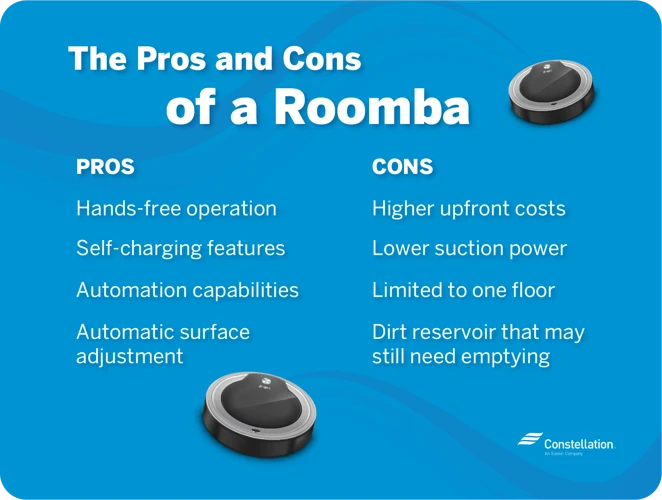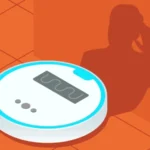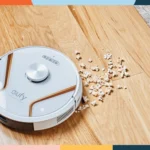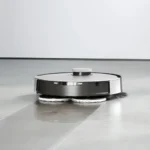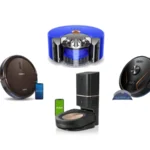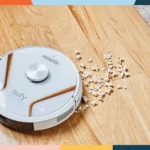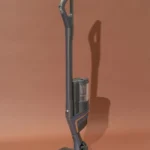Are you tired of dragging around a heavy, inefficient vacuum cleaner? Do you want to upgrade to a smarter, more energy-efficient option? Look no further! Choosing the right energy-efficient smart vacuum cleaner can save you time, money, and electricity. But with so many options available, it can be overwhelming to make the right choice. That’s why we’ve put together this comprehensive guide to help you navigate the features and labels of the most popular energy-efficient smart vacuum cleaners on the market. From suction power to noise level, we’ll cover all the factors you need to consider before making your purchase. So sit back, relax, and let’s find the perfect vacuum for you.
Why Choose an Energy-efficient Smart Vacuum Cleaner?
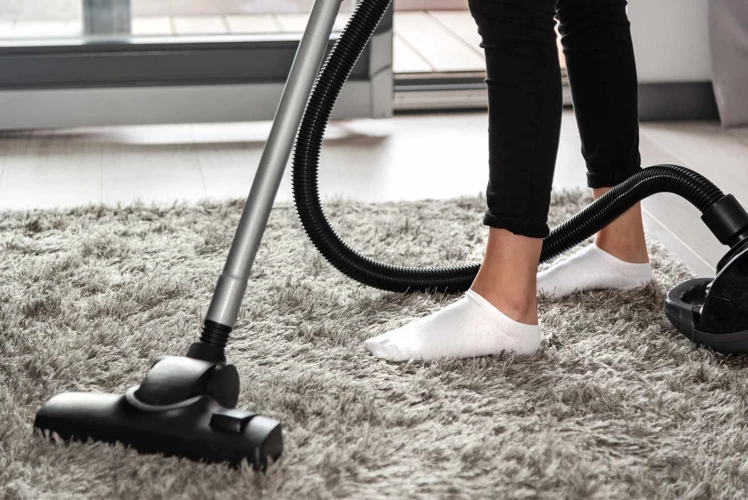
If you’re in the market for a new vacuum cleaner, there are many reasons why you should consider an energy-efficient smart vacuum cleaner. These vacuums not only save energy and money, but also come with a variety of features that help make vacuuming a breeze. By choosing an energy-efficient smart vacuum cleaner, you can reduce your environmental impact and also make your life easier. In this section, we’ll explore the benefits of these vacuums and what to look for when choosing one. Learn more about the benefits of energy-saving smart vacuums and how they can help reduce your carbon footprint.
Benefits of Energy-efficient Smart Vacuum Cleaners
Energy-efficient smart vacuum cleaners have several benefits that positively impact your quality of life, home environment and finances. Here are some advantages of using an energy-efficient smart vacuum cleaner:
- Lower energy consumption: Energy-efficient smart vacuum cleaners consume less energy compared to traditional vacuums, resulting in lower energy bills and a reduced carbon footprint. By choosing a vacuum with energy-efficient motors, you can save even more on energy costs.
- Environment-friendly features: Many smart vacuums have eco-friendly features, such as rechargeable batteries, that are recyclable and long-lasting. These features make smart vacuums sustainable and decrease the number of disposable batteries that end up in landfills.
- Improved indoor air quality: Smart vacuums with high-efficiency filters trap dust, dirt, and allergens better than traditional vacuums. This feature ensures that indoor air is cleaner and fresher.
- Smart-home integration: Energy-efficient smart vacuum cleaners can be controlled using your smartphone, voice commands, or home assistants. This feature enhances comfort and convenience while also reducing your workload.
- Savings on maintenance: Smart vacuums usually require less maintenance than traditional vacuums, resulting in fewer replacements and repair costs. Regular cleaning and maintenance are necessary to maximize energy efficiency, extend the life of the vacuum, and reduce energy consumption.
Using an energy-efficient smart vacuum cleaner can significantly reduce energy consumption and maintenance costs while maintaining high performance levels. It is an eco-friendly choice that benefits both you and the environment. To learn more about how to reduce energy consumption when using a smart vacuum cleaner, check out our tips on reducing energy consumption with smart vacuums or read more about the environmental impact of smart vacuums.
Factors to Consider When Choosing an Energy-efficient Smart Vacuum Cleaner
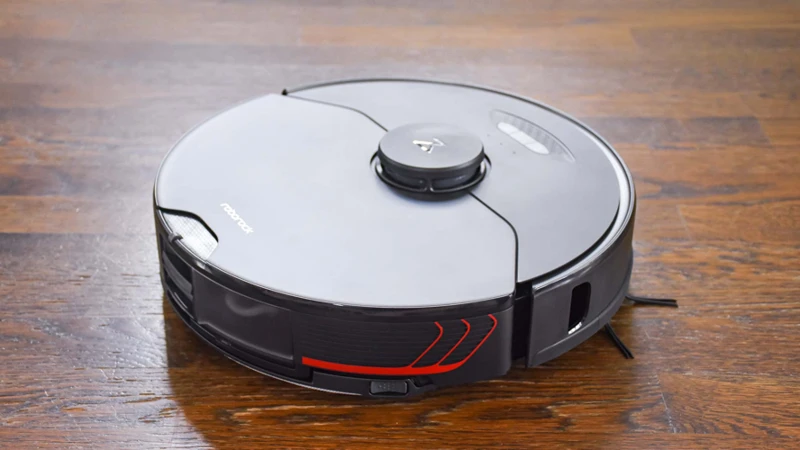
When looking for an energy-efficient smart vacuum cleaner, there are several factors to consider to ensure that you’re making the right choice for your home and your carbon footprint. From suction power to smart features, selecting the right vacuum can help you save energy and reduce your environmental impact. In this section, we’ll go over some of the key factors to keep in mind as you make your decision. By the end, you’ll be equipped with the knowledge you need to make an informed choice and reduce your carbon footprint while vacuuming.
Suction Power
One of the most important factors to consider when choosing an energy-efficient smart vacuum cleaner is its suction power. While it may be tempting to go for a model with the highest suction power available, this may not always be the best option. Higher suction power generally means higher energy consumption, so it’s important to strike a balance between suction power and energy efficiency.
Here are some factors to consider when evaluating suction power:
- Type of Flooring: Different floor types require different suction power. For example, carpets typically require higher suction power than hardwood floors.
- Filtration: A vacuum cleaner with a clogged filter will have reduced suction power. Look for models with efficient filters that are easy to clean and maintain.
- Motor: The type and quality of a vacuum cleaner’s motor can significantly impact its suction power. Look for models with energy-efficient motors to reduce energy consumption and increase suction power.
- Nozzle: The size and design of a vacuum cleaner’s nozzle can also impact suction power. Look for models with adjustable nozzles that can adapt to different floor types.
- Brand and Model: Some brands and models are known for having more powerful and efficient suction than others. Do your research and read reviews before making a purchase.
By considering these factors when evaluating suction power, you can choose a vacuum cleaner with optimal performance and energy efficiency. Additionally, regular maintenance can help improve suction power and reduce energy consumption over time.
Filter
When it comes to choosing an energy-efficient smart vacuum cleaner, the filter is another important factor to consider. A high-quality filter not only ensures clean air but also plays a vital role in prolonging the life of your vacuum cleaner. Let’s take a closer look at the types of filters you can find in smart vacuums.
There are two main types of filters: standard and HEPA. Standard filters are more basic and generally less effective at removing small particles, whereas HEPA filters are highly efficient at removing tiny particles, such as dust and allergens, from the air. If you or anyone in your household suffers from allergies, asthma or other respiratory issues, a vacuum with a HEPA filter is highly recommended.
In addition to the type of filter, you should also consider the filtration system as a whole. Some smart vacuums feature a multi-stage filtration system that captures dust, dirt and allergens more effectively than others.
It’s important to note that while a high-quality filter is great for air quality, it can also impact the suction power of the vacuum cleaner. A clogged or dirty filter can reduce the airflow and suction, lowering the machine’s performance.
It’s essential to regularly clean or replace your vacuum’s filter. Some models come with washable filters, which can save you money in the long run by eliminating the need for frequent filter replacements.
By choosing a smart vacuum with an effective filtration system, you can improve the air quality in your home and reduce the risk of respiratory problems. To learn more about the benefits of energy-efficient smart vacuums, check out our article on smart vacuum energy consumption, which explains how these devices can help you reduce your carbon footprint while cleaning.
Battery Life
When it comes to choosing an energy-efficient smart vacuum cleaner, battery life is an important factor to consider. No one wants to have a vacuum cleaner that dies halfway through cleaning. It is essential to look for a model that has a long-lasting battery.
Battery capacity plays a significant role in determining the runtime of a vacuum cleaner. A higher capacity battery can provide longer run time compared to a lower capacity battery. A battery capacity of at least 2000mAh can provide sufficient run time for cleaning large areas.
Another important aspect to consider is the charging time. Charging time of a battery also affects the overall efficiency of the vacuum cleaner. A quick charging battery can help you get your cleaning tasks done in less time, while a slow charging battery can be inconvenient. Look for a model that offers a charging time of less than 4 hours.
Consider the battery type when choosing a smart vacuum cleaner. Lithium-ion batteries are more efficient than NiCD and NiMH batteries, as they are lightweight, have a higher energy density, and don’t suffer from the ‘memory effect.’ Smart vacuums with rechargeable lithium-ion batteries can last for over 100 minutes of continuous use.
When selecting an energy-efficient smart vacuum cleaner, it is crucial to check the battery specifications to ensure you get a model that offers a long-lasting, quick charging, and efficient battery. Make sure to check the manufacturer’s website or packaging for battery information and compare specifications among different models.
For more information on energy-efficient smart vacuums, check out our related articles on energy-efficient motors in smart vacs and the benefits of choosing a Smart Vacuum Energy Star certified model.
Noise Level
When shopping for an energy-efficient smart vacuum cleaner, you’ll also want to consider the noise level it produces. Whether you live in a small apartment or a large house, you don’t want a vacuum that makes unbearable noise, especially if you have neighbors or young children who need to sleep during the day. To choose a vacuum cleaner with a quiet operation, consider the following factors:
- Decibel rating: Look for vacuums with decibel ratings in the mid-60s or lower. A decibel rating of 70 or above may be too loud for comfort.
- Sensor technology: Some vacuums come with sensors that can detect when your cleaning environment is more sensitive to noise, such as when you’re vacuuming at night or in a room with a sleeping baby. These sensors can help adjust the vacuum’s noise level to fit the environment, making it less obtrusive.
- Quiet Mode: Many modern vacuums come with a Quiet Mode option. This feature usually allows the vacuum to operate at a lower power level, so it produces less noise.
- Battery-powered: Battery-powered vacuums tend to produce less noise than their corded counterparts. This is because they don’t rely on a noisy motor to power them. Instead, they use a battery to operate the vacuum’s suction, making them quieter to use.
By considering these factors, you can choose an energy-efficient smart vacuum cleaner with a noise level that meets your needs, whether you’re looking for something whisper-quiet or simply less noisy than your current vacuum.
Smart Features
When it comes to energy-efficient smart vacuum cleaners, looking at their smart features is essential. These features not only make the cleaning process more efficient but also make it more convenient for you. Here are some of the things to look for when considering the smart features of a vacuum cleaner:
| Smart Feature | Description |
| Wi-Fi Connectivity | Allows you to connect your vacuum to your smartphone, so you can control it remotely even when you are not at home. |
| Voice Control | Enables you to operate your vacuum with Amazon Alexa, Google Assistant or other voice-controlled devices. |
| Multifloor Mapping | Enables the vacuum to remember the different rooms in your home and adjust its cleaning power based on the floor type. |
| Auto Recharge and Resume | Allows your vacuum to go back to its docking station when the battery is low, recharge and continue cleaning where it left off when the battery is charged. |
| Virtual Boundaries | Lets you set up invisible boundaries around specific areas that you want the vacuum to avoid. |
Having these features in your vacuum cleaner can really improve your cleaning experience, offering you more control and convenience while saving energy. While they may add to the overall cost of the vacuum cleaner, their benefits outweigh the cost in the long run. So, when shopping for an energy-efficient smart vacuum cleaner, be sure to consider models that have these features.
How to Interpret Energy Efficiency Labels

When shopping for an energy-efficient smart vacuum cleaner, it’s important to understand how to interpret energy efficiency labels. These labels give consumers an idea of how much energy the vacuum cleaner consumes, and how efficient it is when it comes to performing its cleaning duties.
The primary energy efficiency label to look out for is the Energy Star certification. This certification is given to vacuum cleaners that meet specific energy efficiency standards. One key factor to look for is the annual energy consumption, which is measured in kilowatt-hours (kWh). The lower the number of kWh, the more energy-efficient the vacuum cleaner is.
Another label to consider is the European Union Energy Label. This label features a scale from A to G, with A being the most energy-efficient and G being the least energy-efficient. The label also provides information on the vacuum cleaner’s noise level, dust re-emission level, and cleaning performance.
It’s important to note that while an energy-efficient vacuum cleaner may have a higher upfront cost, it can save you money in the long run by reducing your energy bills. Additionally, an energy-efficient vacuum cleaner is better for the environment, as it reduces the amount of energy needed to power the device.
When interpreting energy efficiency labels, be sure to consider your personal cleaning needs as well. For example, a vacuum cleaner with a high suction power may consume more energy, but it may be necessary for homes with pets or thick carpets. Look for a vacuum cleaner that strikes a balance between energy efficiency and effective cleaning.
Understanding how to interpret energy efficiency labels is an important aspect of choosing an energy-efficient smart vacuum cleaner. Look for Energy Star certification and the European Union Energy Label, and consider your personal cleaning needs when making a purchase. An energy-efficient vacuum cleaner not only saves you money in the long run, but is also better for the environment.
Top Picks for Energy-efficient Smart Vacuum Cleaners
Now that you understand the factors to consider when choosing an energy-efficient smart vacuum cleaner and how to interpret energy efficiency labels, it’s time to take a look at the top picks on the market. The following vacuum cleaners have been chosen based on their energy efficiency, suction power, filter quality, smart features, and customer satisfaction. So, grab a cup of coffee and take a look at these five top picks for energy-efficient smart vacuum cleaners.
1. Dyson Cyclone V10 Absolute
The Dyson Cyclone V10 Absolute is an excellent option for those looking for an energy-efficient smart vacuum cleaner. This top-of-the-line vacuum offers a range of features that make it a great choice for any household. Here are some of the key features of the Dyson Cyclone V10 Absolute:
- Suction Power: The Dyson Cyclone V10 Absolute offers impressive suction power that can easily pick up dirt and debris from any surface.
- Filter: The vacuum comes with a fully-sealed filtration system that captures 99.97% of particles as small as 0.3 microns, making it an excellent option for those with allergies or asthma.
- Battery Life: The Dyson Cyclone V10 Absolute has a long-lasting battery that can run for up to 60 minutes on a single charge.
- Noise Level: Despite its powerful motor, the Dyson Cyclone V10 Absolute is surprisingly quiet, making it a great option for use in any household.
- Smart Features: The Dyson Cyclone V10 Absolute comes with a range of smart features, including a built-in LCD screen that displays battery life and filter maintenance reminders.
The Dyson Cyclone V10 Absolute is a fantastic option for those looking for an energy-efficient smart vacuum cleaner that offers powerful suction, advanced filtration, and a range of smart features that make cleaning easier and more efficient.
2. Shark ION Robot R85
The Shark ION Robot R85 is a great option for those looking for an energy-efficient and smart vacuum cleaner. It has a sleek design and advanced features that make it efficient and effective in cleaning.
Here are some key features and specifications of the Shark ION Robot R85:
| Feature | Specification |
|---|---|
| Suction Power | The Shark ION Robot R85 has strong suction power that can easily pick up dirt, dust, and pet hair from carpets and hard floors. |
| Filter | The vacuum cleaner has a high-efficiency filter that captures allergens and dust particles, making it an ideal option for those with allergies or respiratory problems. |
| Battery Life | The Shark ION Robot R85 has a long battery life of up to 90 minutes per charge, giving you enough time to clean your whole house. |
| Noise Level | The vacuum cleaner operates quietly, producing less than 65 decibels of noise, making it ideal for use in homes with pets or sleeping babies. |
| Smart Features | The Shark ION Robot R85 comes with a number of smart features, including voice control compatibility with Amazon Alexa and Google Assistant, a mobile app for remote control and scheduling, and sensors that help the vacuum navigate around obstacles and avoid falls. |
The Shark ION Robot R85 is an excellent choice for those who want the convenience of a robotic vacuum cleaner while also being energy-efficient and environmentally friendly. Its strong suction power and high-efficiency filter ensure a thorough and deep clean of your home. Plus, its long battery life and quiet operation make it a great option for anyone who wants to clean their house without disturbing others. And with its array of smart features, including voice control compatibility and a mobile app, you can easily schedule and control the vacuum from anywhere in the house. The Shark ION Robot R85 is a great investment for anyone who wants a high-quality, efficient, and intelligent vacuum cleaner.
3. iRobot Roomba i7+
When it comes to energy-efficient smart vacuum cleaners, the iRobot Roomba i7+ is definitely worth considering. Here are some key features of this model:
- Advanced Navigation: The iRobot Roomba i7+ uses advanced navigation technology to map out your home and efficiently clean each room.
- Powerful Suction: This vacuum cleaner uses a high-efficiency filter and powerful suction to effectively clean dirt, debris, and pet hair from carpets and hard floors.
- Smart Features: The Roomba i7+ is equipped with Wi-Fi connectivity and can be connected to your smart home system for voice control with Amazon Alexa or Google Assistant.
- Self-Cleaning: One of the most notable features of the Roomba i7+ is that it empties its own dustbin, which reduces the amount of times you need to empty it.
- Energy Efficiency: The iRobot Roomba i7+ has an ENERGY STAR rating, which ensures that it uses energy efficiently, while still maintaining high performance.
The iRobot Roomba i7+ is an investment that can help simplify your life while keeping your home clean and energy-efficient.
4. Ecovacs Deebot 901
The Ecovacs Deebot 901 is another excellent choice for those looking for an energy-efficient smart vacuum cleaner. It is designed with advanced features that make cleaning more convenient and efficient. Here are some reasons why the Deebot 901 is a top pick in this category:
- Efficient cleaning: With its advanced mapping technology and laser sensors, the Deebot 901 can navigate your home with ease, cleaning every nook and cranny along the way.
- Powerful suction: The Deebot 901 boasts a powerful suction system that can pick up even the smallest dirt and debris. Plus, its interchangeable suction inlet allows you to customize the suction power depending on the type of flooring in your home.
- Smart home compatibility: The Deebot 901 is compatible with both Amazon Alexa and Google Assistant, allowing you to control it with your voice or through the app.
- Long battery life: This vacuum cleaner can clean your home for up to 90 minutes on a single charge, thanks to its high-capacity battery. You can be sure that the Deebot 901 will be able to clean your home in one go without needing to recharge.
- Efficient filter system: The Deebot 901 comes with a high-efficiency filter that captures up to 99% of air particles, making it an ideal choice for those with allergies or respiratory problems.
- User-friendly app: With the Ecovacs app, you can schedule cleaning times, monitor the cleaning process, and even create virtual boundaries to keep the vacuum away from certain areas.
The Ecovacs Deebot 901 is an excellent energy-efficient smart vacuum cleaner that combines efficient cleaning with advanced features. Its powerful suction, long battery life, and smart home compatibility make it a top choice for modern homeowners who want an easy and efficient way to keep their homes clean.
5. Samsung POWERbot R7040
One of the top choices for an energy-efficient smart vacuum cleaner is the Samsung POWERbot R7040. This robotic vacuum cleaner not only has impressive suction power, but it also has a range of smart features that make cleaning a breeze. Here’s a breakdown of some of its key features:
| Suction Power | 20 watts |
| Filter | Washable filter to capture dust and allergens |
| Battery Life | Up to 60 minutes on a single charge |
| Noise Level | 70 decibels |
| Smart Features | Compatible with Amazon Alexa and Google Assistant, has remote control app, and Visionary Mapping technology to create a floor plan for efficient cleaning |
The Samsung POWERbot R7040 has an impressive suction power of 20 watts, making it capable of picking up even the smallest dust particles. Plus, its washable filter is designed to capture dust and allergens, which is great for people with allergies or asthma.
This smart vacuum cleaner also has a long battery life of up to 60 minutes on a single charge, so you can clean multiple rooms without having to stop and recharge. Additionally, its noise level of 70 decibels is relatively quiet, making it a good option for those who don’t want a vacuum that’s too loud.
But what sets the Samsung POWERbot R7040 apart from other robotic vacuum cleaners is its range of smart features. It is compatible with Amazon Alexa and Google Assistant, so you can control it with your voice. Plus, it has a remote control app that allows you to program it to clean on a set schedule or use manual controls. And with Visionary Mapping technology, this vacuum cleaner creates a floor plan for efficient cleaning, ensuring that every nook and cranny is cleaned.
The Samsung POWERbot R7040 is a great option for those who want a powerful, energy-efficient smart vacuum cleaner with a range of smart features.
Conclusion
After careful consideration of various factors such as suction power, filter, battery life, noise level, and smart features, it’s clear that energy-efficient smart vacuum cleaners are a smart investment for any household.
The benefits of energy-efficient smart vacuum cleaners are numerous. First, they use less energy than traditional vacuums, which not only saves money on your electricity bill but also reduces your carbon footprint. Second, their smart features make cleaning a breeze with features such as scheduling, voice control, and even mapping your home’s layout for more efficient cleaning. Third, their powerful suction power and advanced filters ensure that even the most stubborn dirt, dust, and allergens are extracted from your floors and carpets.
When choosing an energy-efficient smart vacuum cleaner, it’s important to evaluate the suction power, filter, battery life, noise level, and smart features. Look for models with high suction power and efficient filters to ensure a deep clean of your floors and carpets. Choose a model with a long battery life, so it can clean your entire home in one go. Take note of the noise level, especially if you have children or pets at home. And, consider the smart features that will make your cleaning routine more convenient and efficient.
Interpreting energy efficiency labels is also important. Look for models with the Energy Star label or other eco-friendly certifications that ensure their energy efficiency. These labels will help you make an informed decision and choose a vacuum that not only gets the job done, but is also environmentally friendly.
Our top picks for energy-efficient smart vacuum cleaners are the Dyson Cyclone V10 Absolute, Shark ION Robot R85, iRobot Roomba i7+, Ecovacs Deebot 901, and Samsung POWERbot R7040. These models offer a range of features that cater to different cleaning needs and preferences, making them great investments for any household.
In conclusion, energy-efficient smart vacuum cleaners are a smart choice for any household. They offer energy efficiency, powerful suction power, advanced filters, long battery life, low noise level, and smart features that make cleaning easier and more efficient. So, invest in a model that suits your cleaning needs and enjoy a cleaner and healthier home.
Frequently Asked Questions
1. What is the difference between a smart vacuum cleaner and a traditional vacuum cleaner?
A smart vacuum cleaner can be controlled remotely using a mobile app, voice commands or even by scheduling cleaning tasks. It also has additional sensors and features that can help it navigate through your home more efficiently.
2. Can energy-efficient smart vacuum cleaners clean carpets?
Yes, many energy-efficient smart vacuum cleaners come with powerful suction settings that can deep clean carpets, remove pet hair and other debris.
3. Do energy-efficient smart vacuum cleaners require any maintenance?
Yes, you will need to clean or replace filters, empty dustbins and brush rolls periodically. Refer to the user manual for specific instructions on maintenance and cleaning.
4. Can energy-efficient smart vacuum cleaners work without Wi-Fi?
Yes, but their smart features such as scheduling and remote control will not be available. You will also need to manually start and stop the cleaning process.
5. What is the battery life of energy-efficient smart vacuum cleaners?
The battery life of smart vacuum cleaners varies depending on the model and the suction power settings being used. Some models can last for up to two hours on a single charge.
6. Can energy-efficient smart vacuum cleaners collect large debris such as food crumbs or pet toys?
Yes, many models come with larger dustbins and powerful suction capability that can pick up bigger debris.
7. How do I choose the best energy-efficient smart vacuum cleaner for my home?
You should consider factors such as suction power, filter, battery life, noise level and smart features. Refer to our detailed guide in the article for more information.
8. Are energy-efficient smart vacuum cleaners expensive?
Energy-efficient smart vacuum cleaners range in price but can be more expensive than traditional vacuum cleaners. However, they can save you money in the long run by consuming less energy and reducing your utility bills.
9. Can smart vacuum cleaners detect and avoid obstacles?
Yes, many smart vacuum cleaners come with sensors that can detect and avoid obstacles such as furniture, stairs and walls.
10. Can I program energy-efficient smart vacuum cleaners to clean at specific times?
Yes, many models come with a scheduling feature that allows you to program them to clean at specific times that are convenient for you.
